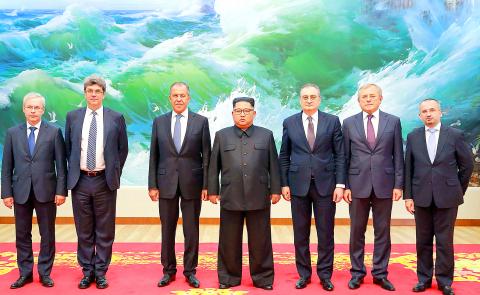As Cambodia’s once-robust media freedom comes under attack, Chinese-linked outlets have found new footing ahead of next month’s general elections, pushing the country’s media toward an authoritarian model — and bolstering Cambodian Prime Minister Hun Sen’s tight grip on power.
Critical coverage is increasingly drowned out by gushing pro-government tirades and pro-Beijing content as China extends its influence beyond business into Cambodia’s media.
At the forefront of this shift is government-friendly Web site Fresh News. The owner Lim Chea Vutha, wearing a crisp suit and sporting a flashy ring, welcomes Beijing’s support with open arms, namely in the form of sponsored trips to China.

Photo: AFP
“As a Cambodian citizen, I declare that I support China, I support Chinese investment in Cambodia,” Lim Chea Vutha, 38, said in the company’s modern newsroom as dozens of young reporters huddled over computers nearby.
Several of his employees have been treated to reporting trips on Beijing’s dime, and he traveled there in early June last year, he said.
In February, he launched a Chinese-language edition, which brims with articles hailing the Cambodian government’s achievements and Chinese state media coverage.
His sentiment reflects the country’s love affair with its communist neighbor, which last year floated US$1.4 billion in approved foreign direct investment as part of its massive Belt and Road Initiative — double the previous year’s amount and outspending all other countries.
Chinese loans have relieved Hun Sen of reliance on the Western aid that pushed Cambodia’s democratization after the Khmer Rouge’s brutal reign ended in 1979.
That has given Hun Sen, who has been in office for 33 years, room to choke independent media that he was once under pressure to permit, smoothing the path to election victory on July 29.
The unravelling has paralleled a crackdown on the opposition Cambodian National Rescue Party, which was dissolved in November last year, prompting Western countries to pull funding for the vote.
The combative Cambodia Daily closed in September last year under the weight of a massive tax bill believed to be politically motivated, while US-backed Radio Free Asia was shuttered and two of its reporters arrested two months later.
That left only the Phnom Penh Post, which spiraled into mayhem after a Malaysian investor — whose PR firm has worked for the government — bought the newspaper in April.
What remains are almost solely government-friendly outlets, many owned by Hun Sen’s cronies and relatives.
Although far from Beijing’s sophisticated control of information, Cambodia’s media landscape is starting to echo China’s, said Reporters Without Borders (RSF), which defines the model as media used to promote government aims and development.
“It’s going to be journalism with Chinese characteristics,” RSF East Asia head Cedric Alviani said.
Government officials have in some cases openly praised the way Chinese media operate, Western diplomat in Cambodia said.
It is an unexpected turn for a country once heralded as a beacon of media freedom in a region dogged by censorship.
Chinese influence also comes in the form of investment into state-run Cambodian media.
NiceTV debuted last year as a venture between the China-based NICE Culture Investment Group and the government, delivering news broadcasts and entertainment in Khmer from a studio inside the Cambodian Ministry of the Interior.
The company is to cooperate with Chinese state media outlets and air one program called “National Security News,” Chinese media reports said.
An interior ministry official told reporters that the station would help educate Cambodians about “basic law.”
The Chinese Ministry of Foreign Affairs denied pouring money into Cambodian media, telling reporters that it only conducts media exchanges to promote “mutual understanding between countries and peoples.”
However, a Cambodian journalist who travelled to China on a government-funded trip had a different view, saying that the controlled visit was designed to impress.
“We stayed always in at least four-star hotels in any city that we went to,” the reporter said, adding that interviews were lined up with officials and trying to speak with people not on the itinerary was difficult.
Fresh News does not receive direct funding from Beijing and operates independent of the Cambodian government, Lim Chea Vutha said.
However, the Web site is widely seen as a state mouthpiece.
He told reporters that he built a relationship with Hun Sen over the span of at least 10 interviews — access almost unheard of in Cambodia.
The exclusives have helped Fresh News grow to a dominant digital outlet in just four years.
Lim Chea Vutha welcomes the growth and said he would embrace assistance from Beijing.
“If China helps Fresh News, Fresh News is happier,” he said.

FRUSTRATIONS: One in seven youths in China and Indonesia are unemployed, and many in the region are stuck in low-productivity jobs, the World Bank said Young people across Asia are struggling to find good jobs, with many stuck in low-productivity work that the World Bank said could strain social stability as frustrations fuel a global wave of youth-led protests. The bank highlighted a persistent gap between younger and more experienced workers across several Asian economies in a regional economic update released yesterday, noting that one in seven young people in China and Indonesia are unemployed. The share of people now vulnerable to falling into poverty is now larger than the middle class in most countries, it said. “The employment rate is generally high, but the young struggle to

ENERGY SHIFT: A report by Ember suggests it is possible for the world to wean off polluting sources of power, such as coal and gas, even as demand for electricity surges Worldwide solar and wind power generation has outpaced electricity demand this year, and for the first time on record, renewable energies combined generated more power than coal, a new analysis said. Global solar generation grew by a record 31 percent in the first half of the year, while wind generation grew 7.7 percent, according to the report by the energy think tank Ember, which was released after midnight yesterday. Solar and wind generation combined grew by more than 400 terawatt hours, which was more than the increase in overall global demand during the same period, it said. The findings suggest it is

TICKING CLOCK: A path to a budget agreement was still possible, the president’s office said, as a debate on reversing an increase of the pension age carries on French President Emmanuel Macron yesterday was racing to find a new prime minister within a two-day deadline after the resignation of outgoing French Prime Minister Sebastien Lecornu tipped the country deeper into political crisis. The presidency late on Wednesday said that Macron would name a new prime minister within 48 hours, indicating that the appointment would come by this evening at the latest. Lecornu told French television in an interview that he expected a new prime minister to be named — rather than early legislative elections or Macron’s resignation — to resolve the crisis. The developments were the latest twists in three tumultuous

IN THE AIR: With no compromise on the budget in sight, more air traffic controllers are calling in sick, which has led to an estimated 13,000 flight delays, the FAA said Concerns over flight delays and missed paychecks due to the US government shutdown escalated on Wednesday, as senators rejected yet another bid to end the standoff. Democrats voted for a sixth time to block a Republican stopgap funding measure to reopen government departments, keeping much of the federal workforce home or working without pay. With the shutdown in its eighth day, lines at airports were expected to grow amid increased absenteeism among security and safety staff at some of the country’s busiest hubs. Air traffic controllers — seen as “essential” public servants — are kept at work during government shutdowns, but higher numbers